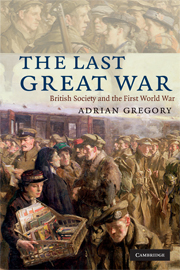Book contents
- Frontmatter
- Contents
- Illustrations
- Acknowledgements
- Introduction: The war that did not end all wars
- 1 Going to war
- 2 Defining the enemy: Atrocities and propaganda 1914–1915
- 3 From spectatorship to participation; From volunteering to compulsion 1914–1916
- 4 Economies of sacrifice
- 5 Redemption through war: Religion and the languages of sacrifice
- 6 The conditional sacrifices of labour 1915–1918
- 7 Struggling to victory 1917–1918
- 8 The last war?
- Conclusion
- Notes
- Index
Conclusion
Published online by Cambridge University Press: 05 June 2014
- Frontmatter
- Contents
- Illustrations
- Acknowledgements
- Introduction: The war that did not end all wars
- 1 Going to war
- 2 Defining the enemy: Atrocities and propaganda 1914–1915
- 3 From spectatorship to participation; From volunteering to compulsion 1914–1916
- 4 Economies of sacrifice
- 5 Redemption through war: Religion and the languages of sacrifice
- 6 The conditional sacrifices of labour 1915–1918
- 7 Struggling to victory 1917–1918
- 8 The last war?
- Conclusion
- Notes
- Index
Summary
She felt no rancour to these Huns; time had washed away from her any anger at the man, the regiment, the Hun Army, the nation that had taken Sam's life.
Her resentment was against those who had come later, and whom she refused to dignify with the amicable name of Hun. She hated Hitler's war for diminishing the memory of the Great War, for allotting it a number, the mere first among two. And she hated the way that the Great War was held responsible for the latter, as if Sam, Dennis and all the East Lancashires who fell were partly the cause of that business. Sam had done what he could – he had served and died – and was punished all too quickly with becoming subservient in memory. Time did not behave rationally … she blamed it on 1939–45.
Julian Barnes, ‘Evermore’, in Cross Channel (London, 1996), p. 105War experiences
Subservient in memory. In many respects the British people of 1914–1918, soldier and civilian alike, have disappeared into our constructions of them, our collective memory. Like the character above I blame it on 1939–1945. The people of 1914–1918 were fully human, not crude abstractions. Absorbed in the writings of Robert Saunders, Edie Bennett, Harold Cousins, Andrew Clark, Harry Cartmell, Frank Lockwood, Elizabeth Fernside, Eva Isaacs and all the others, it is their humanity that strikes me.
- Type
- Chapter
- Information
- The Last Great WarBritish Society and the First World War, pp. 277 - 296Publisher: Cambridge University PressPrint publication year: 2008
- 2
- Cited by



